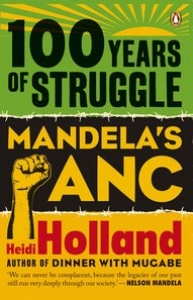
When I first heard about Heidi Holland’s new book, I have to admit that the thought of ploughing through a doorstop of ANC history was rather daunting.
However, I quickly realised that I was in for a pleasant surprise. Not only is the book accessible in terms of its size, but it also tells the story of the ANC through the anecdotes of its members, thereby offering a fresh take on Africa’s oldest liberation movement.
Heidi Holland started researching this book in 1986 while the ANC was still banned. Whilst initially intent on writing a book about Mandela, she had to abandon this idea due to the fact that there was hardly any information available about him. It was then that she decided to write a book on the ANC and started doing research, from Mandela’s home village of Qunu in the Eastern Cape to the ANC offices in Lusaka; gleaning information from interviews, any books that were available and the ANC publication Sechaba. An earlier version of this book was released in 1990, the same week that Mandela was released from prison, and this updated version was released in the first week of January 2012 as the ANC embarked on its centenary celebrations.
Whilst Mandela’s own story is woven through all the chapters of this book, there are many other members of the ANC, both well-known and virtually unheard of, whose stories are told. Indeed, one of the things I enjoyed most about this book was reading about some of the unsung heroes of the struggle. The courage of Vuyisile Mini in marching to the gallows with his fist held high in the ANC salute while singing freedom songs gave me goosebumps as did Wellington Bongco’s statement on hearing that he had been sentenced to death: ‘You are going to hang Bongco but you will never hang freedom.’
As well as the many personal stories that you are unlikely to find anywhere else, 100 Years of Struggle – Mandela’s ANC also looks at all the major events, debates and figures in the ANC’s history, from the Freedom Charter to Sharpeville and the Soweto Uprising; from Africanism to Nationalism and Walter Sisulu to Jacob Zuma.
100 years after the party was first formed in dusty Bloemfontein, Holland argues that the struggle is far from over because in spite of defeating the Apartheid machine, the ANC have still not managed to create a ‘better life for all’. I would say that this book is a must-read for anyone interested in the ANC or more broadly in the events and people that have shaped the South Africa that we live in today. There are no saints and sinners in Heidi’s book, just ordinary people that did extraordinary things; who had flaws as well as strengths.
I guess the question to ask after reading this book, is what does the next 100 years hold? In a country that is as unpredictable as it is diverse, I suppose we’ll just have to wait and see.






